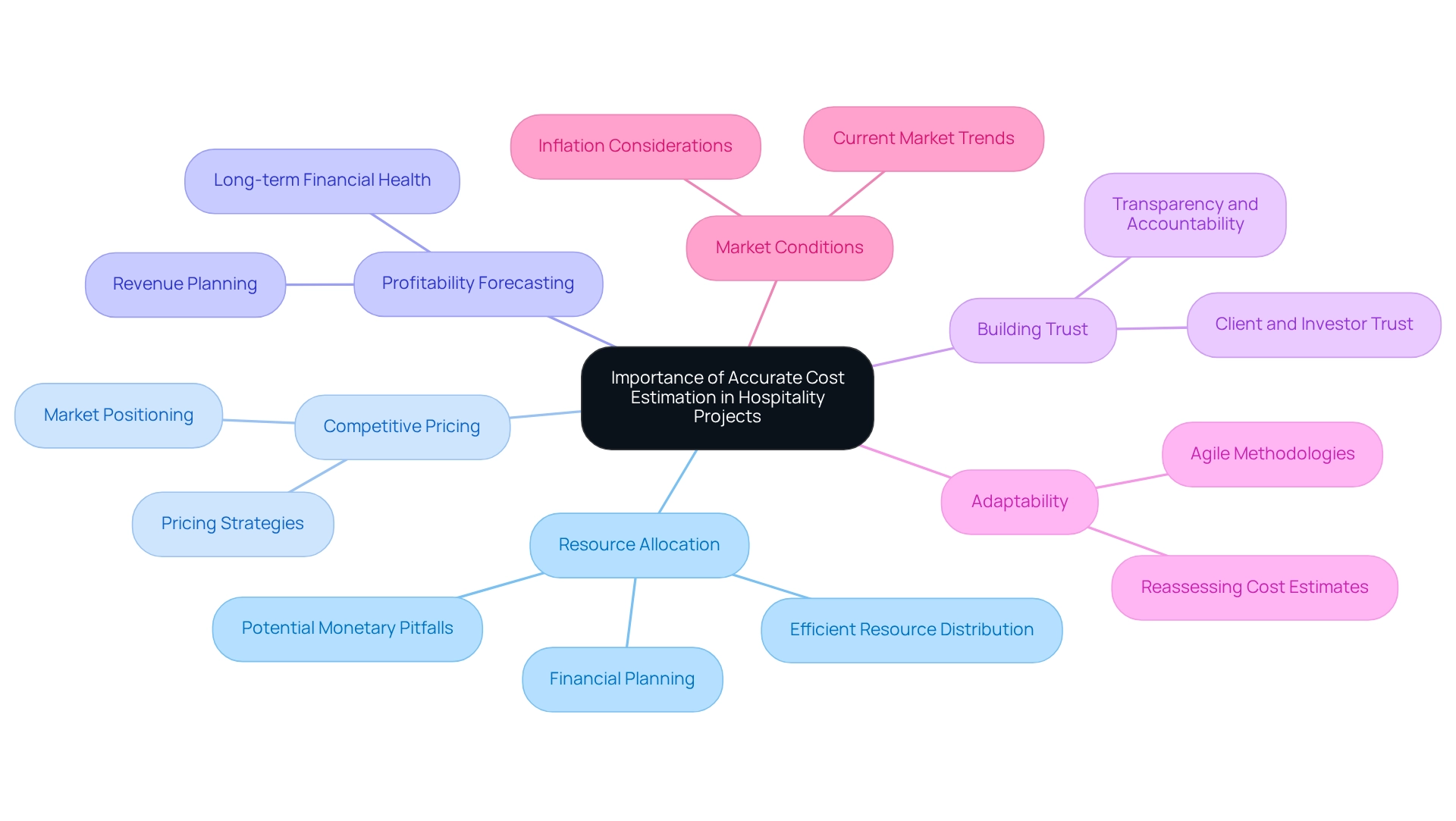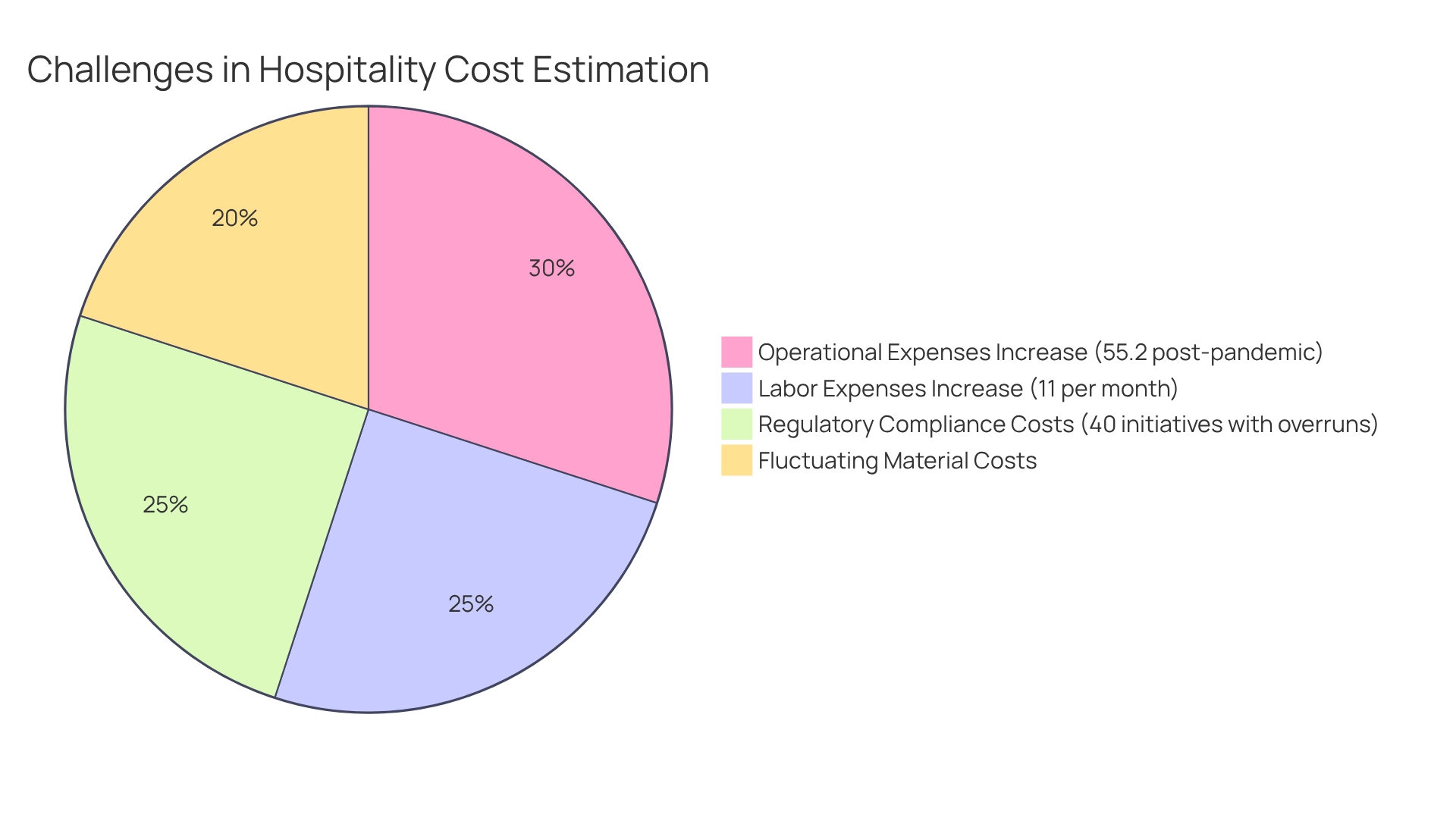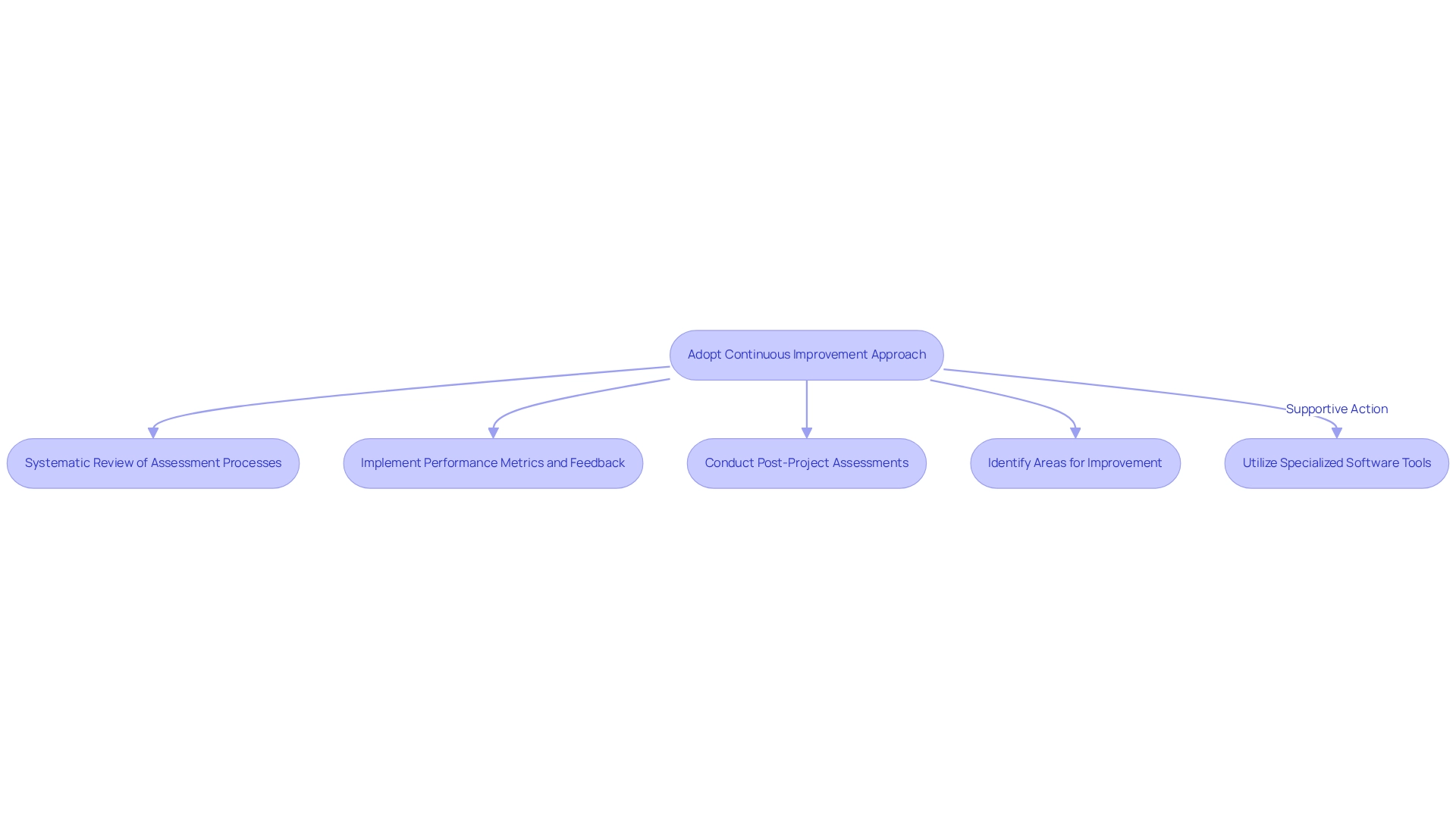23 Apr 2025
BlogOverview
This article delves into the significant challenges and techniques inherent in accurate construction cost estimation within hospitality projects. The necessity of precise budgeting is underscored, as it plays a pivotal role in financial planning and resource allocation. Common issues such as fluctuating material and labour costs are highlighted, emphasising the critical need for continuous improvement. Furthermore, the article discusses the utilisation of advanced tools designed to enhance estimation accuracy, reinforcing the idea that effective strategies can lead to successful project outcomes.
Introduction
In the competitive realm of hospitality, the precision of cost estimation can truly make or break a project. As developers navigate the complexities of financial planning, the stakes are undeniably high. Accurate estimates not only facilitate resource allocation and pricing strategies; they also safeguard against unforeseen financial pitfalls. With industry data highlighting the critical nature of forecasting, the importance of adeptly managing costs becomes evident.
As market dynamics shift and challenges arise, from fluctuating material prices to regulatory compliance, project managers must employ effective techniques and tools to enhance accuracy. By embracing a continuous improvement ethos, organisations can refine their estimation processes. This ensures alignment with business objectives and ultimately secures their place in a thriving industry.
Are you prepared to elevate your cost estimation strategies to meet these demands?
Understand the Importance of Accurate Cost Estimation in Hospitality Projects
Precise budgeting is vital in hospitality ventures, significantly impacting financial planning and implementation. It enables developers to allocate resources efficiently, establish competitive pricing, and forecast profitability. A meticulously prepared financial estimate, which includes construction cost estimates, can uncover potential monetary pitfalls early, allowing stakeholders to make informed decisions. Accurate construction cost estimates help build trust with clients and investors, reflecting a commitment to transparency and accountability in financial management.
The influence of cost assessment extends beyond short-term monetary effects; it plays a vital role in aligning goals with business objectives. For instance, Edmond Shipway’s expertise in the service industry is exemplified through significant case studies, such as a £250 million project, which emphasise how flexible strategies can enhance collaboration among teams and stakeholders. By reevaluating expense estimates based on evolving project needs, teams can maintain alignment with business objectives and respond effectively to changing dynamics. This adaptability is particularly crucial in the hospitality sector, where market conditions can shift rapidly.
Furthermore, developers are encouraged to consult various sources for precise construction cost estimates and to account for inflation over time. This practice is essential for ensuring that construction cost estimates accurately reflect current market conditions and the requirements of the project. As Edmond Shipway articulates, ‘Accurate construction cost estimates enable risk-adjusted budgets,’ highlighting the critical function of precise financial evaluation in managing monetary risks. In 2025, the significance of precise financial forecasting in service industry initiatives remains paramount, as it directly correlates with success and overall fiscal well-being.

Identify Common Challenges in Hospitality Cost Estimation
The challenges within the service industry can significantly impact construction cost estimates, leading to inaccuracies and budget overruns. Fluctuating material expenses stand out as a primary concern, as they can vary dramatically due to market conditions. Notably, the service industry has experienced an average rise in labour expenses of 11% each year since April 2021, driven by workforce shortages and escalating inflation. Additionally, service sector enterprises faced a staggering 55.2% increase in operational expenses post-pandemic, complicating budget management. This trend not only influences timelines for initiatives but also escalates overall expenditures, with labour expenses previously accounting for 35-45% of operating revenue. Moreover, regulatory modifications can result in unforeseen expenses, further complicating construction cost estimates and the budgeting process. A recent study revealed that 40% of service sector initiatives encountered budget overruns due to unexpected regulatory compliance expenses. Such challenges underscore the critical need for proactive management in the creation of construction cost estimates. By identifying potential challenges early, managers can develop backup plans and adjust their estimates, thereby reducing the risk of financial deficits.
In 2025, the landscape of service pricing estimation continues to evolve, compelling companies to adapt to persistent price hikes from suppliers. Edmond Shipway provides tailored consultancy services designed to assist businesses in navigating these complexities. Furthermore, leveraging technology can enhance forecasting capabilities, ensuring improved financial management and operational adaptability in this dynamic environment. The importance of precise forecasting cannot be overstated; it is essential for managing customer demand and revenue, ultimately reinforcing the financial stability of service-related ventures.

Implement Effective Cost Estimation Techniques and Tools
To enhance the precision of construction cost estimates in hospitality ventures, managers must employ a combination of efficient methods and contemporary tools. One effective technique is parametric estimating, which leverages historical data from similar projects to inform expense forecasts. This approach not only provides a reliable foundation for construction cost estimates but also streamlines the evaluation process. Recent studies categorise the factors influencing price assessment performance into six key themes:
- Input control
- Behaviour control
- Output control
- Complexity
- Task characteristics
- Technology characteristics
Understanding these themes is vital for improving budget assessment accuracy.
Furthermore, utilising advanced software tools such as N3 can significantly automate calculations for construction cost estimates, minimising human errors and enhancing efficiency. The impact of automation in hospitality is transforming operations, leading to improved service and sustainability.
Notable case studies, including a luxury hotel project valued at £30 million, illustrate the influence of technology on pricing. For instance, by employing a cloud-based assessment tool in the luxury hotel project, the team reduced the time spent on financial analysis by 50%, enabling them to concentrate on strategic planning and execution. This shift not only increased productivity but also improved the overall management process. Similarly, other projects reaped benefits from advanced methodologies that optimised construction cost estimates, aligning with findings from previous studies that underscore the importance of efficient expense evaluation methods in minimising budget overruns and ensuring project success.
Regular training on these tools is essential to ensure that staff remain proficient and can effectively utilise new features and updates. By fostering a culture of continuous education, managers in the service industry can maintain high levels of accuracy in their financial estimates, ultimately leading to more successful outcomes. As evidenced, tailored details leave a lasting impression, enhancing guest loyalty and return visits, which underscores the importance of precision in financial assessment.
Adopt a Continuous Improvement Approach to Cost Estimation
Implementing a continuous improvement strategy for budgeting is essential for enhancing precision and effectiveness in hospitality construction projects. This approach necessitates a systematic review and refinement of assessment processes, guided by performance metrics and feedback. Post-project assessments are integral to this strategy, allowing teams to analyse discrepancies between construction cost estimates and actual expenses, thereby identifying specific areas for improvement. For instance, a hospitality company that established a continuous feedback loop experienced a remarkable 20% increase in accuracy over two years.
At Edmond Shipway, our commitment to leadership and innovation in management and consultancy fosters this philosophy of ongoing enhancement. We offer a range of services, including:
- Project management
- Cost consultancy
- M&E client advisory
- Sustainability consultancy
All aimed at refining the accuracy of financial assessments. We cultivate a culture of open dialogue among team members, promoting the exchange of insights and best practises, which significantly bolsters the overall effectiveness of financial forecasting efforts. As highlighted, “By engaging every employee in a culture of continuous improvement and innovation, companies achieve increased quality, improved safety, better customer and employee satisfaction, and a significant ROI.” By prioritising continuous improvement, organisations can not only adapt to changing market conditions but also secure a competitive edge in the hospitality sector.
Moreover, it is vital to identify common pitfalls in budgeting practises, such as reliance on outdated information or lack of team collaboration, which can lead to inaccuracies. The impact of post-completion assessments on construction cost estimates and financial forecasting accuracy is substantial; they provide critical insights that inform subsequent projects, ensuring forecasts align more closely with actual expenses. Additionally, leveraging specialised software estimation tools can enhance accuracy and efficiency in construction cost estimates.
In summary, adopting a continuous improvement approach not only results in superior project outcomes but also equips organisations to excel in a competitive landscape, particularly in the hospitality sector.

Conclusion
Accurate cost estimation stands as a cornerstone of success in hospitality projects, profoundly influencing financial planning, resource allocation, and overall project execution. It empowers developers to identify potential financial pitfalls early, fostering trust with clients and investors while aligning project objectives with business goals. In a landscape marked by challenges such as fluctuating material costs and regulatory changes, the necessity for precise forecasting remains paramount. By employing techniques like parametric estimating and leveraging advanced software solutions, project managers can significantly enhance the accuracy of their estimates, ultimately safeguarding their projects against budget overruns.
The hospitality sector encounters unique challenges that complicate cost estimation, including rising labour costs and unexpected regulatory compliance expenses. Proactive management, coupled with the development of contingency plans, is essential to mitigate these risks. By embracing a continuous improvement approach, organisations can refine their estimation processes, learn from past projects, and adapt to the ever-evolving landscape of the industry. This commitment to ongoing enhancement not only improves accuracy but also cultivates a culture of innovation and collaboration among teams.
In conclusion, elevating cost estimation strategies is crucial for thriving in the competitive hospitality industry. By prioritising accuracy, embracing technology, and fostering a culture of continuous improvement, organisations can effectively navigate financial uncertainties and secure their positions in the market. The future of hospitality development hinges on adeptly managing costs, ensuring project success, and ultimately delivering exceptional value to clients and stakeholders.
Share


